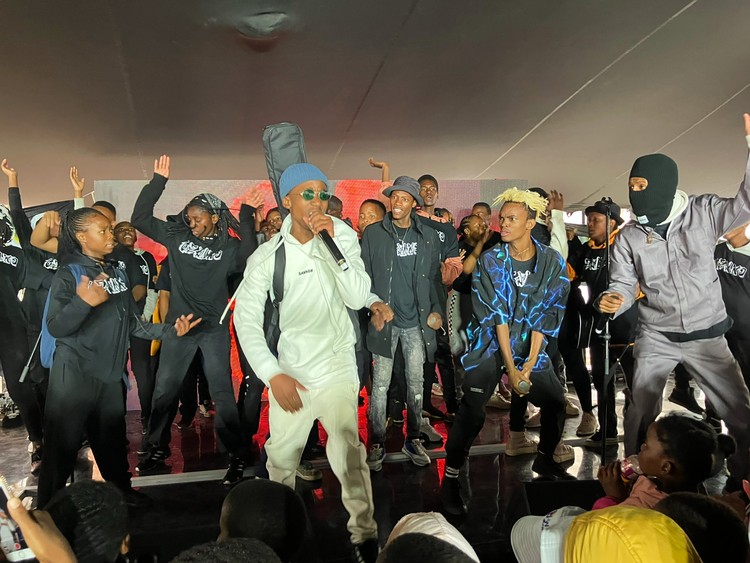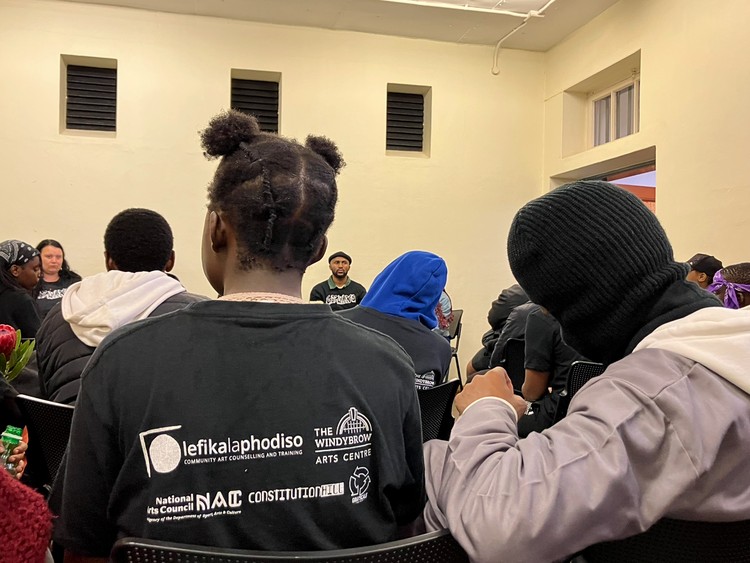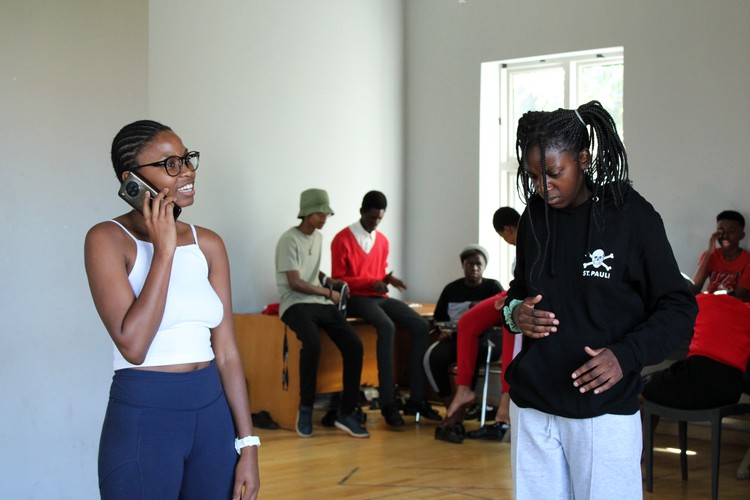Joburg teens bring Constitution Hill to life with hip-hop
“In Hillbrow where we live, it’s easier for a child to join a life of crime… I was really excited to see them perform” says parent
Young people from Johannesburg’s inner city perform at the Uzwano Festival at Constitution Hill on Saturday. The festival was a showcase of hip-hop-inspired music and theatre celebrating human rights. Photos: Masego Mafata
Constitution Hill’s Old Fort came alive on Saturday as dozens of young people living in Johannesburg’s inner city took to the stage to showcase their talent in the Uzwano Festival.
Many of the performers attend weekly after-school programmes at Lefika La Phodiso Community Art Counselling Centre and the Windybrow Arts Centre. They performed original songs, dances and a play exploring the theme of human rights and unity. Uzwano means unity in isiZulu.
Lefika and Windybrow host art, drama and music workshops for learners in Johannesburg’s inner city. Lefika also provides free art therapy for children.
The Uzwano Festival, funded by the National Arts Council, was performed on the People’s Theatre stage at Constitution Hill’s Human Rights Festival which ran from 25 to 26 March. The sizeable audience braved overcast and rainy weather conditions to watch the learners’ performances.
About 50 teenagers were involved in the festival which was born from a project developed and facilitated by drama therapy interns at Lefika, using hip-hop as a tool of expression.
“The learners are the real stars of Uzwano. They are the inspiration and driving force behind the project,” said Sanelisiwe Dlamini, one of the interns.
The idea for the Uzwano Festival came from workshops with learners attending after-school art and drama therapy sessions with Lefika La Phodiso Community Art Counselling and Windybrow Arts Centre.
Through her work with learners at Lefika, Dlamini says she noticed that the learners were listening to a lot of hip-hop music, and were talented singers and dancers too. “We wanted to find a way to showcase the teenagers’ talents while addressing the issues they are facing,” she said.
Dlamini says the learners are confronted by the harsh reality of life in the inner city, including xenophobia and violence, as well as other issues faced by teenagers, such as self-discovery and belonging, she said.
Under the guidance of the project’s facilitators, the learners workshopped a “coming-of-age” play about identity. The protagonist is a teenage girl who is an outcast and is on a journey of self-discovery. The play explores themes such as xenophobia, peer pressure and the culture of “blessers” who take advantage of economically vulnerable young people. Dlamini said it was important to cast a female lead for the play “so that young girls watching can be inspired”.
“We hope the learners take their crafts seriously after this experience. We hope they believe in their talents as much as we do,” Dlamini says.
Thandeka Mavhura (right) and Mpho Mabale (left) performed leading roles in the play workshopped through the Uzwano project. “We started with something as simple as a word, then we added music and dance moves. I have enjoyed the process of watching it come together,” says Mabale.
Thandeka Mavhura said being part of Uzwano had allowed her to channel her energy into something positive. “Balancing rehearsals with school, homework, chores and other personal responsibilities hasn’t been easy but this place has felt like home,” she said.
Drama therapy combines drama-based methods and the clinical aspects of psychology, according to Lebogang Mokgatle, drama therapy intern at Lefika. The Uzwano project allowed learners to use hip-hop as a way to express aspects of their life stories, said Mokgatle. “Therapy was the key element of this process and hip-hop was the tool of expression,” he said.
Parent Thuli Mnguni said she hoped Lefika and Windybrow would get more support. “ In Hillbrow where we live, it’s easier for a child to join a life of crime. There is also a lot of violence out there. It’s better for them to be doing things like this. I was really excited to see them perform today and I hope to see more of this,” she said.
Support independent journalism
Donate using Payfast

Don't miss out on the latest news
We respect your privacy, and promise we won't spam you.
Next: Unemployment the main cause of homelessness in Tshwane, report finds
Previous: Concern in Parliament over slow pace of prosecutions for Lottery corruption
© 2023 GroundUp. This article is licensed under a Creative Commons Attribution-NoDerivatives 4.0 International License.
You may republish this article, so long as you credit the authors and GroundUp, and do not change the text. Please include a link back to the original article.
We put an invisible pixel in the article so that we can count traffic to republishers. All analytics tools are solely on our servers. We do not give our logs to any third party. Logs are deleted after two weeks. We do not use any IP address identifying information except to count regional traffic. We are solely interested in counting hits, not tracking users. If you republish, please do not delete the invisible pixel.



